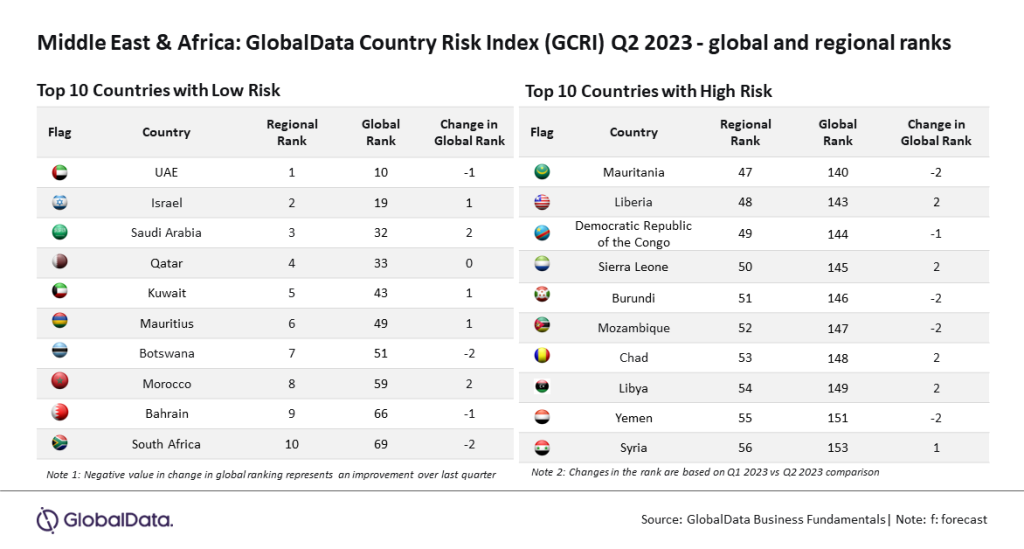
Lagos — The economic prospects for the Middle East and Africa (MEA) region are marked by significant uncertainties, primarily stemming from a worldwide economic slowdown, decline in oil production, and the ongoing food security issues.
Moreover, escalating heatwaves in the Middle East and a deteriorating humanitarian crisis in Africa further compound the difficulties. Against this backdrop, the risk score of the MEA region was 53.5 out of 100, the highest compared to all other regions in the Q2 2023 update, reveals GlobalData, a leading data and analytics company.
Nonetheless, there was a slight dip in the MEA region’s risk score from 54.4 in Q1 2023 to 53.5 in Q2 2023. This marginal decline was primarily propelled by the robust growth in the non-oil sector, driven by increased tourism and construction activities. Specifically, Saudi Arabia’s non-oil activities exhibited strong annual growth of 6.1% in Q2 2023, while the UAE recorded an average annual growth rate of 7.8% in non-oil activities during H1 2023.
Additionally, Nigeria saw accelerated growth in its non-oil sector, reaching 3.6% on an annual basis in Q2 2023, surpassing the 2.8% growth observed in Q1 2023.
In the 21st update version of GlobalData’s “Global Risk Report Quarterly Update – Q2 2023,” which evaluated 56 countries in the MEA region, two countries were identified in the very low-risk zone, five countries in the low-risk zone, 14 countries under manageable risk, 20 countries under high risk and 15 countries in the very high-risk zone.
“GlobalData’s projections indicate a substantial slowdown in the GCC nations’ growth, dropping from 6.5% in 2022 to 2.1% in 2023. This deceleration is primarily attributed to the anticipated contraction of the hydrocarbon sector, driven by oil production cuts.
However, the growth outlook for 2023 is expected to be sustained by a 4.3% expansion in non-oil activities, as estimated by the World Bank. This growth surge is underpinned by increased private consumption and robust fixed investments,” Bindi Patel, Senior Economic Research Analyst at GlobalData, comments.
In the Q2 2023 GCRI update, among the top 15 high-risk nations out of a total of 153 countries assessed, a noteworthy 11 countries belong to the MEA region. Conversely, when considering the list of the 15 lowest-risk countries worldwide in the same update, only the UAE made an appearance.
Nigeria’s position advanced by one spot, placing it at 130th out of 153 nations in Q2 2023 GCRI update. This improvement was attributed to a significant 38.7% surge in trade surplus during Q2 2023 compared to the previous quarter. Conversely, Egypt’s ranking declined by one position to 91st. This slip in rank was a consequence of a notable drop in natural gas production, hitting a three-year low in the initial five months of 2023.
A severe humanitarian crisis continues in Africa with the seven East African countries, Djibouti, Ethiopia, Kenya, Somalia, South Sudan, Sudan, and Uganda, experiencing unprecedented levels of food insecurity, affecting nearly 60 million people, as reported by the World Food Programme in June 2023.
In Q2 2023, a severe heatwave intensified climate change concerns across the region. Egypt reached 100°F (38°C), causing record power use and daily outages into September. Jordan faced rising electricity demand. Baghdad sweltered at 120°F (49°C) with power shortages, while Kuwait hit 122°F (50°C). Iran declared emergency holidays due to heat and electricity issues. Climate vulnerability was evident with wildfires and water shortages.
Additionally, in September 2023, a powerful storm caused devastating floods in eastern Libya, claiming over 2,300 lives. Morocco suffered a catastrophic earthquake during the same month, leaving 3,000 dead and affecting around 100,000 children, per the United Nations.
“The region faces substantial economic, humanitarian, and environmental challenges. Despite these difficulties, there are pockets of growth in non-oil sectors, and regional economies must look towards green growth strategies to both accelerate economic development and address climate change concerns. Amid the ongoing humanitarian crisis, there is a pressing need for African economies to undertake structural reforms to stimulate economic growth across the region,” Patel concludes.



